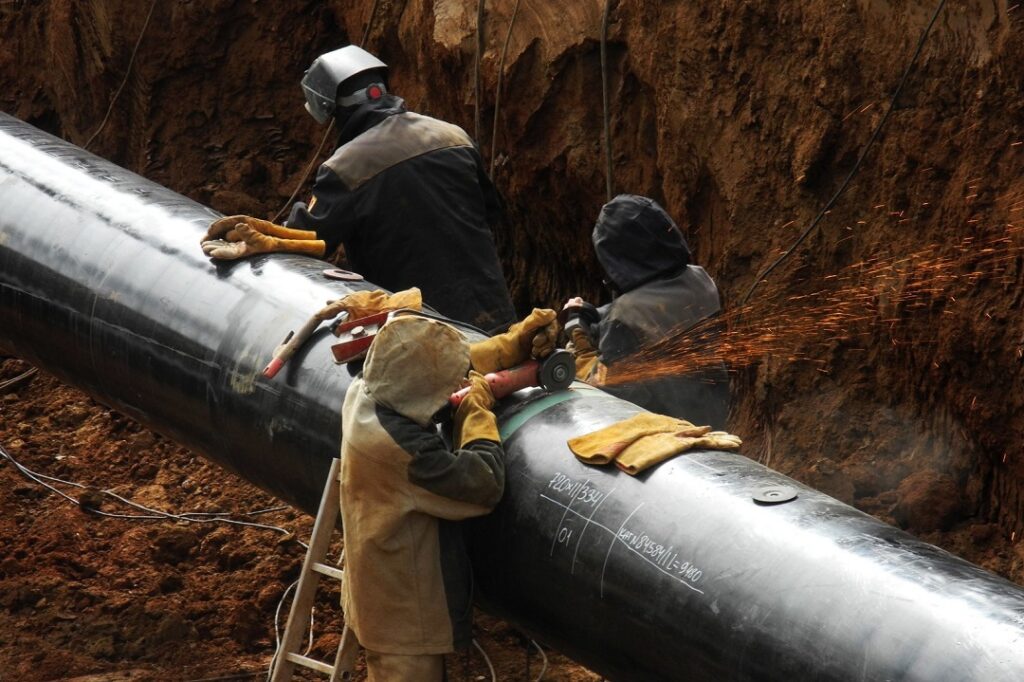- One of Africa’s biggest pipeline is the 4,100Km Trans-Sahara Gas Pipeline connecting Nigeria and Algeria oil fields.
- At 1,443Km East African Crude Oil Pipeline will connect Uganda’s oil fields to Tanzania’s coast.
- Cutting across seven countries, the Central African Pipeline System will include refineries, gas-to-power plants, and LNG terminals.
As oil and gas industries continue to grow in Africa, the construction of regional, intra-African pipelines has a huge part to play in distributing these hydrocarbons across the continent, allowing Africa to reap the benefits of its energy resources.
These benefits included improved access, availability, and affordability of energy as well as energy security. It also contributes to added revenue to the participating countries and the skills development of local companies and individuals.
Africa, a continent teeming with untapped energy potential, has long been grappling with the challenge of delivering its vast oil and gas resources to its energy-hungry populations.
With over 600 million people currently without access to electricity, the demand for reliable and affordable energy sources is more pressing than ever. Against this backdrop, the emergence of regional pipeline systems is poised to be a game-changer, paving the way for enhanced energy security, economic growth, and social development across the continent.
The Trans-Sahara Gas Pipeline (TSGP)
One of the most ambitious pipeline projects on the horizon is the Trans-Sahara Gas Pipeline (TSGP). This huge undertaking promises to span over 4,100 kilometers, connecting southern Nigeria to northern Algeria.
It is a tri-partnership between the Nigerian National Petroleum Corporation (NNPC) at 90 percent, Algerian NOC Sonatrach, and Niger at 10 per cent.
With an estimated investment of $13 billion, the TSGP will have an annual capacity of 30 billion cubic meters of natural gas. TSGP will catalyze cross-border energy trade while bolstering economic ties between participating nations.
East African Crude Oil Pipeline (EACOP)
Another remarkable initiative is the East African Crude Oil Pipeline (EACOP), a testament to regional cooperation in the oil sector. It is a joint venture between TotalEnergies, China National Oil Corporation (CNOOC), Uganda National Pipeline Company, and Tanzania Petroleum Development Corporation. EACOP is set to traverse 1,443 kilometers, connecting Uganda’s oil fields to Tanzania’s coast.
The project, valued at $3.5 billion, is projected to transport approximately 216,000 barrels of crude oil per day. The partners say it will propel economic growth and ignite new opportunities for both countries.
EACOP is owned by TotalEnergies (62 per cent), China National Oil Corporation (CNOOC) (8 per cent), Uganda National Pipeline Company (15 per cent), and Tanzania Petroleum Development Corporation (15 per cent).
Central African Pipeline System (CAPS)
In the heart of the continent, the Central African Pipeline System (CAPS) stands out. The project encompasses refineries, gas-to-power plants, LNG terminals, and transnational oil and gas pipelines.
CAPS was signed as an agreement by seven countries. They include Burundi, Cameroon, Central African Republic, Chad, the Democratic Republic of the Congo, Equatorial Guinea, Gabon, and Rwanda. It aims to streamline intra-African trade and foster economic development.
While still in the planning phase, this holistic approach reflects a commitment to long-term energy solutions.
Addressing Africa’s Energy Challenges
As Africa’s population continues to surge, meeting energy demands has become an imperative for sustainable development. Africa’s oil and gas reserves, boasting approximately 125.3 billion barrels of oil and over 600 trillion cubic feet of natural gas, hold the key to unlocking energy poverty.
However, the lack of adequate pipeline infrastructure and insufficient investment have hampered the efficient distribution of these resources, perpetuating energy scarcity and impeding socio-economic progress.
Investing in regional pipeline infrastructure holds the potential to reshape Africa’s energy landscape. Not only will it enhance energy security, but it will also catalyze economic growth. What’s more, it will foster employment opportunities, and empower local enterprises.
The TSGP, EACOP, and CAPS projects are projected to generate thousands of high-paying jobs, thereby contributing directly to regional economic advancement.
A shared vision for Africa’s energy future
Recognizing the imperative to address energy poverty, the African Energy Chamber (AEC) encourages collaboration and investment in regional pipeline infrastructure. NJ Ayuk, the Executive Chairman of the AEC, emphasizes the need to seize the potential of Africa’s oil and gas resources. He says this initiative will achieve mutual growth and eradicate energy poverty by 2030.
Also Read: The new West African frontier eyeing oil and gas billions
African Energy Week 2023
In the midst of these transformative developments, African Energy Week 2023 emerges as a pivotal event for Africa’s oil and gas sector. Scheduled from October 16-20 in Cape Town, the conference will explore new revenue streams for ongoing pipeline projects. It will also explore potential new ventures.
As nations come together to share progress on regional pipeline systems and strike new deals, the event serves as a rallying point for Africa’s energy stakeholders. It helps chart a course toward a brighter and more energy-secure future.
Africa’s journey towards harnessing its energy potential through regional pipeline systems is not just a story of infrastructure and economics. It’s also a narrative of empowerment, collaboration, and shared progress.
As these pipelines traverse vast landscapes and cross national boundaries, they carry with them the promise of a more connected, prosperous, and sustainable continent, where the benefits of energy resources are accessible to all.
